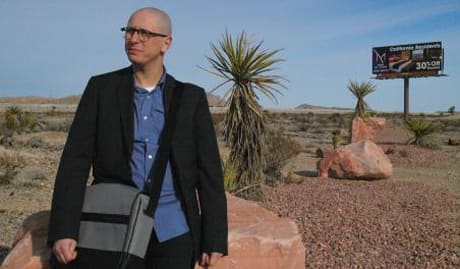Because Gary Burns has made a career of finding hilarity amidst the manufactured landscapes of suburban restlessness and apathy (Kitchen Party), occasionally satirizing the caged repression of urban office buildings (Waydowntown), it's easy to forgive the veiled, hippie-dippy didactics consistent throughout his works.
Even his latest manipulated documentary projects with collaborator Jim Brown (Radiant City, The Future is Now!) utilize a typically dry medium in a playful manner, addressing seeming issues with tongue partially in cheek by maintaining a comic, almost after school, tone while injecting actors into the documentation process to shake things up.
In The Future is Now!, Liane Balaban plays an alacritous reporter investigating public opinion of social issues. Referred to as the Woman of Tomorrow, she confronts the Man of Today (Paul Ahmarani), a practical realist (or "libertarian," as she calls him), whose lack of hope for humanity and the world challenges her idealizing of a social lexicon, which of course, results in a protracted odyssey of a forced ideological shift given the externality of her identity.
The documentary aspect of the film comes from her various assignments for the Man of Today, forcing him to interview artists, architects, self-proclaimed philosophers, poets and even a dip-shit nihilist. And while the conversation with the nihilist actually proves quite amusing, involving an argument about the frivolity of protest in some chic, pretentious jazz bar, most of the interviews and Ahmarani's inevitable paradigm shift come off as glib at best.
It's difficult to take his change and development seriously when they come from such insipid nonsense, such as a poet that jumbles up letters and words from other works to make something new. Since the Man of Today's worldview is so specifically articulated, it's hard to believe that he would be so easily swayed by such broad ego tactics and superficial discussions.
Of course, since the narrative flow is so light-hearted, none of this comes off as particularly threatening, rather it's just frustrating given the seeming template of academic discourse. The wit demonstrated in the opening title card, which reads something to the effect of, "This film is dedicated to all the scientists, artists and activists that have hope for the future, despite evidence to the contrary," simply isn't consistent throughout the entire film. And Balaban's unearned supercilious tone is grating after awhile.
What is most interesting about this Canadian call to action is the incidental, which is the fact that the Man of Today is an upstanding member of society, perfectly content with his lack of worldly hope, never interfering with others while upholding his respect for their individual rights and beliefs. The Woman of Tomorrow feels compelled to force her views onto someone else, unable to cope with the base annihilation anxiety of existential crises, which alone speaks multitudes.
(eOne)Even his latest manipulated documentary projects with collaborator Jim Brown (Radiant City, The Future is Now!) utilize a typically dry medium in a playful manner, addressing seeming issues with tongue partially in cheek by maintaining a comic, almost after school, tone while injecting actors into the documentation process to shake things up.
In The Future is Now!, Liane Balaban plays an alacritous reporter investigating public opinion of social issues. Referred to as the Woman of Tomorrow, she confronts the Man of Today (Paul Ahmarani), a practical realist (or "libertarian," as she calls him), whose lack of hope for humanity and the world challenges her idealizing of a social lexicon, which of course, results in a protracted odyssey of a forced ideological shift given the externality of her identity.
The documentary aspect of the film comes from her various assignments for the Man of Today, forcing him to interview artists, architects, self-proclaimed philosophers, poets and even a dip-shit nihilist. And while the conversation with the nihilist actually proves quite amusing, involving an argument about the frivolity of protest in some chic, pretentious jazz bar, most of the interviews and Ahmarani's inevitable paradigm shift come off as glib at best.
It's difficult to take his change and development seriously when they come from such insipid nonsense, such as a poet that jumbles up letters and words from other works to make something new. Since the Man of Today's worldview is so specifically articulated, it's hard to believe that he would be so easily swayed by such broad ego tactics and superficial discussions.
Of course, since the narrative flow is so light-hearted, none of this comes off as particularly threatening, rather it's just frustrating given the seeming template of academic discourse. The wit demonstrated in the opening title card, which reads something to the effect of, "This film is dedicated to all the scientists, artists and activists that have hope for the future, despite evidence to the contrary," simply isn't consistent throughout the entire film. And Balaban's unearned supercilious tone is grating after awhile.
What is most interesting about this Canadian call to action is the incidental, which is the fact that the Man of Today is an upstanding member of society, perfectly content with his lack of worldly hope, never interfering with others while upholding his respect for their individual rights and beliefs. The Woman of Tomorrow feels compelled to force her views onto someone else, unable to cope with the base annihilation anxiety of existential crises, which alone speaks multitudes.
